Update — November 5, 2015: The House Energy and Commerce Health Subcommittee voted to advance the “Helping Families in Mental Health Crisis Act.”
While few people in the mental health community would disagree our nation needs a major mental health system makeover, there are varying opinions about how this should be done. Rep. Tim Murphy’s “Helping Families in Mental Health Crisis Act” has gotten the most buzz — and after being reintroduced this summer, the House Energy and Commerce Subcommittee on Health started marking up the bill Tuesday, getting it ready for a vote. Currently the bill has 161 cosponsors.
Here’s some information from those who support the bill, those who are against it and those who want to see something passed but think Murphy’s bill has room for improvement. This is a highlight reel — you can read the bill in full here.
The case for the bill:
1. Supporters argue the bill focuses on getting help for the seriously mentally ill and prevents “wasteful” spending by the Substance Abuse and Mental Health Services Administration (SAMHSA).
 By tightening funding criteria for mental health programs and moving responsibility for mental health care and funding under an Assistant Secretary for Mental Health and Substance Abuse Treatment within the Department of Health and Human Services, this bill reins in the power of SAMHSA — a federal organization that spends over a billion dollars on mental health programming, which it’s been accused of spending frivolously.
By tightening funding criteria for mental health programs and moving responsibility for mental health care and funding under an Assistant Secretary for Mental Health and Substance Abuse Treatment within the Department of Health and Human Services, this bill reins in the power of SAMHSA — a federal organization that spends over a billion dollars on mental health programming, which it’s been accused of spending frivolously.
“The Helping Families in Mental Health Crisis Act is the first bill in many years with provisions that help the seriously ill. It starts to end federal funding of pop psychology, pseudo-science and antipsychiatry. It replaces mission-creep with a dose of mission control. It sends the seriously ill to treatment, rather than jails shelters, prisons and morgues.” — D.J. Jaffe, founder of MentalIllnessPolicy.org
2. Clarification of HIPAA laws will give caregivers more access to information.
 This bill would modify the Health Insurance Portability and Accountability Act (HIPAA), which deals with patients’ rights to health information privacy. As HIPAA is currently interpreted, parents and other caregivers of adults with serious mental illness have had difficulty accessing important information, which restricts participation by family members in their loved ones’ care. This clarification enables caregivers to receive usually protected health information when a mental health care provider believes this kind of disclosure is necessary to help a patient.
This bill would modify the Health Insurance Portability and Accountability Act (HIPAA), which deals with patients’ rights to health information privacy. As HIPAA is currently interpreted, parents and other caregivers of adults with serious mental illness have had difficulty accessing important information, which restricts participation by family members in their loved ones’ care. This clarification enables caregivers to receive usually protected health information when a mental health care provider believes this kind of disclosure is necessary to help a patient.
“Mental illness is the only illness that has an age limit for care. Treatment is hard to come by at any age, but once a person turns 18, the options diminish entirely and family members no longer have a say in their loved ones’ care. Our nation has traded hospitals for jail cells, we have traded compassionate care for the cold harsh elements of the streets, and our current laws have tied the hands of parents and caregivers. But somehow we have managed to convince ourselves that these options are better than treatment, that somehow criminalizing a person with a diagnosable illness preserves their ‘patient rights.’ We are pleading with members of Congress to pass HR-2646, The Helping Families in Mental Health Crisis Act as it is written.” — Leisl Stoufer, mother of a child with a mental illness.
3. It incentives states for creating Assisted Outpatient Treatment laws.
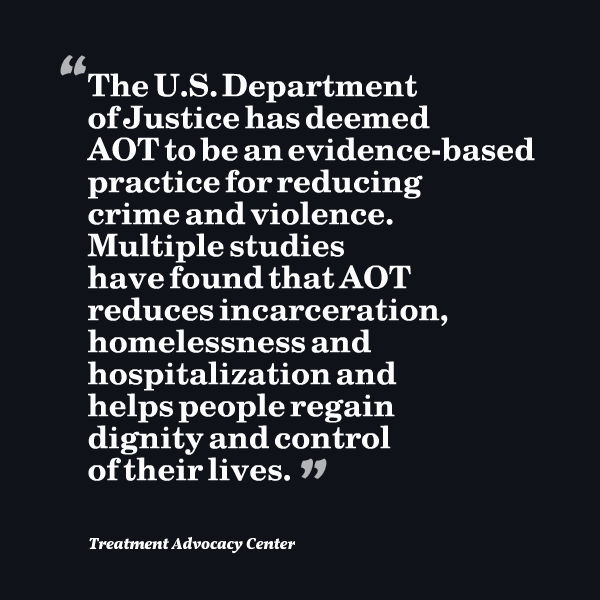 In arguably one of the most controversial parts of the bill, states would be rewarded a 2 percent increase in their general mental health/substance abuse funding from the government when they implement Assisted Outpatient Treatment (AOT) laws — meaning states can require individuals with a diagnosed mental illness to take anti-psychotic medication if that medication has proven to help them in the past, if they have a history of violence or repeated hospitalizations. Organizations like National Alliance of Mental Illness who support AOT see it as a “last resort.”
In arguably one of the most controversial parts of the bill, states would be rewarded a 2 percent increase in their general mental health/substance abuse funding from the government when they implement Assisted Outpatient Treatment (AOT) laws — meaning states can require individuals with a diagnosed mental illness to take anti-psychotic medication if that medication has proven to help them in the past, if they have a history of violence or repeated hospitalizations. Organizations like National Alliance of Mental Illness who support AOT see it as a “last resort.”
“The US Department of Justice has deemed AOT to be an evidence-based practice for reducing crime and violence. Multiple studies have found that AOT reduces incarceration, homelessness and hospitalization and helps people regain dignity and control of their lives. Independent research also has found that AOT can save sufficient taxpayer money to expand other mental health services with the savings. The majority of patients who have utilized AOT say it helped them; many credit AOT with saving their lives.” — Treatment Advocacy Center
4. It adjusts Medicaid and Medicare to expand mental health coverage.
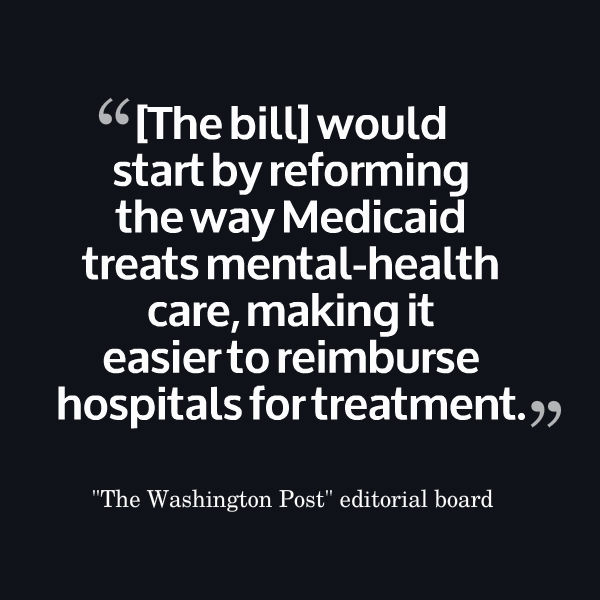 To prevent states from re-opening large psychiatric hospitals, the government refused to allow Medicare and Medicaid payments to larger-than-16-bed facilities. Murphy’s bill would repeal the exclusion as long as a facility kept patients less than 30 days. The bill will also stop Medicaid coverage from prohibiting payment for a same-day mental health service and physical health service.
To prevent states from re-opening large psychiatric hospitals, the government refused to allow Medicare and Medicaid payments to larger-than-16-bed facilities. Murphy’s bill would repeal the exclusion as long as a facility kept patients less than 30 days. The bill will also stop Medicaid coverage from prohibiting payment for a same-day mental health service and physical health service.
“Championed by Rep. Tim Murphy (R-Pa.), [the bill] would start by reforming the way Medicaid treats mental-health care, making it easier to reimburse hospitals for treatment and removing a rule blocking payment for mental and physical health care delivered on the same day.” — “The Washington Post” editorial board, in support of the bill.
What others would like to see changed:
1. The bills shifts too extremely in the other direction, leaving out people who are in recovery.
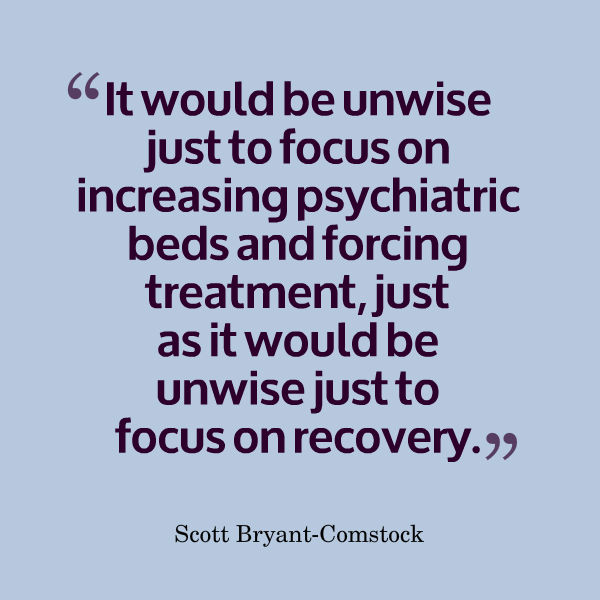 Scott Bryant-Comstock, president of the Children’s Mental Health Network, argues while those with serious mental illness need more access to treatment, this bill shifts federally priority too far into intensive services, leaving services unbalanced in the other direction.
Scott Bryant-Comstock, president of the Children’s Mental Health Network, argues while those with serious mental illness need more access to treatment, this bill shifts federally priority too far into intensive services, leaving services unbalanced in the other direction.
“What continues to get lost in the debate about the Murphy bill is that the two ends of the continuum of services for individuals with serious mental illness need each other. It would be unwise just to focus on increasing psychiatric beds and forcing treatment, just as it would be unwise just to focus on recovery. The fact is that there will be times when an individual needs services of the highest intensity. But to only focus on the most intensive services, while at the same time deriding the recovery movement that is there waiting to embrace the individual with serious mental illness and welcome them back into the community, is just plain foolish.” — Scott Bryant-Comstock, president of the Children’s Mental Health Network.
2. Gutting SAMSHA is hurtful, not helpful.
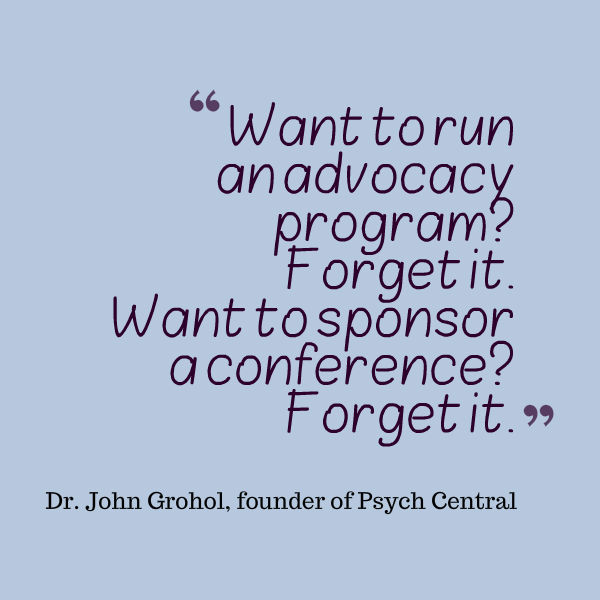 Some critics have said the new position (an Assistant Secretary for Mental Health and Substance Abuse Treatment) will micro-manage SAMSHA. They’re afraid putting a limiting criteria on SAMSHA’s funding will stop programs that provide important resources for the community as a whole.
Some critics have said the new position (an Assistant Secretary for Mental Health and Substance Abuse Treatment) will micro-manage SAMSHA. They’re afraid putting a limiting criteria on SAMSHA’s funding will stop programs that provide important resources for the community as a whole.
“Want to run an advocacy program? Forget it. Want to sponsor a conference? Forget it.” — Dr. John Grohol, founder of Psych Central
3. The language of the bill doesn’t speak to the idea that recovery is possible.
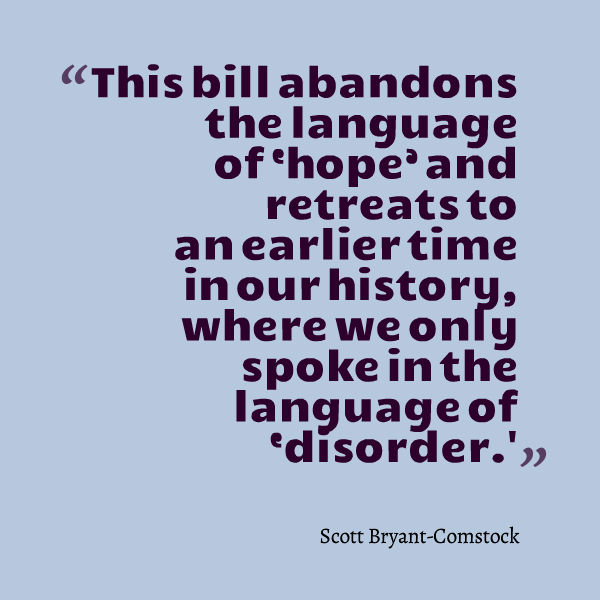 Bryant-Comstock also argued the language of the bill leaves out the idea of hope, going so far as to say it “takes us back in time.”
Bryant-Comstock also argued the language of the bill leaves out the idea of hope, going so far as to say it “takes us back in time.”
“This bill abandons the language of ‘hope’ and retreats to an earlier time in our history, where we only spoke in the language of ‘disorder.’ It would be a shame to see the progress made to de-stigmatize language and provide a sense of hope to those with mental illness wiped away with the stroke of a pen.” — Scott Bryant-Comstock, president of the Children’s Mental Health Network.
4. Some critics argue the bill takes away rights of those who are mentally ill.
 Some who oppose the bill argue encouraging states to enforce Assisted Outpatient Treatment laws infiltrates on the rights of individuals with mental illness, who would in some cases be prevented from refusing treatment. Christian Exoo, a blogger for “Mad in America,” called the changes to HIPAA “discriminatory,” claiming it will reduce the privacy rights of individuals with mental illnesses and discourage them from seeking treatment.
Some who oppose the bill argue encouraging states to enforce Assisted Outpatient Treatment laws infiltrates on the rights of individuals with mental illness, who would in some cases be prevented from refusing treatment. Christian Exoo, a blogger for “Mad in America,” called the changes to HIPAA “discriminatory,” claiming it will reduce the privacy rights of individuals with mental illnesses and discourage them from seeking treatment.
“The Helping Families in Mental Health Crisis Act would expand outpatient commitment laws, curbing the civil rights of millions of Americans. That expansion is predicated on the assumptions that the mentally ill are more likely to engage in violence than the general population, and that forced medication will reduce this violence.” — Christian Exoo, blogger for Mad in America.
This only scratches of surface. If you’re interested in learning more about what mental health advocates have to say about the bill, here are some resources:
-Statement from Mental Health America
-Letter from major mental health groups encouraging Congress to act.
-The best case for the bill can be found on MentalIllnessPolicy.org.
-The best case against the bill, on the Children’s Mental Health Network blog.
“Here is the little secret about ‘divisiveness’ between mental health advocates that politicians don’t want you to know. When you get advocates in a room together, away from the political spotlight, more often than not, they are in agreement about the need for a spectrum of mental health supports and services, not one end of the continuum versus the other. We need federal mental health reform legislation to reflect that same continuum approach at the state, tribal and local level.” — Scott Bryant-Comstock
What do you think? Tell us in the comments below.
Getty image

